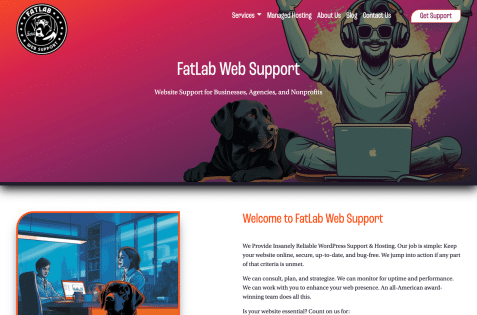Introduction

As businesses scale up, their online presence becomes significantly more crucial. Enterprise-level organizations are characterized by complex website requirements, ranging from high traffic management and robust security measures to seamless integration with existing infrastructure. These enterprise sites are not merely websites but intricate platforms that need to serve multiple functions concurrently, from marketing to sales to customer service.
Enter WordPress. Originally a simple blogging tool, WordPress has evolved into a versatile content management system (CMS) capable of handling the needs of enterprise-level websites. Leveraging its robust features, scalability, and vibrant ecosystem of plugins and themes, WordPress meets the unique demands of large-scale operations, offering a cost-effective and flexible solution. Whether customizing the user interface, integrating with third-party applications, or managing vast content libraries, enterprise WordPress development can cater to all these needs efficiently and effectively.
Understanding Enterprise WordPress Development

Enterprise WordPress development, at its core, is about harnessing the power of WordPress’s open-source nature to build complex, highly customizable, and scalable websites for large organizations. It’s not just about using WordPress as a CMS but pushing its boundaries to meet enterprise business needs.
What sets this apart is its focus on scalability and customization. WordPress’s inherent flexibility allows developers to create tailored solutions that can scale alongside the business. From custom plugins that integrate seamlessly with the organization’s operational workflows to themes that reflect the brand’s unique identity, everything can be modified to perfection.
Furthermore, it excels in content management. With the ability to handle vast content libraries and deliver them across various channels, it caters to the dynamic needs of large-scale operations and enterprise clients. Its built-in SEO tools and the ability to integrate with powerful SEO plugins make it the preferred choice for organizations who wish to stay ahead in the digital space.
Finally, security and high availability of enterprise site are paramount in enterprise WordPress development. It involves implementing stringent security measures, regular updates, and ensuring a high website uptime, providing a reliable and secure digital platform for large enterprises.
In essence, enterprise WordPress development transforms the widely used CMS into a powerhouse capable of supporting the most demanding business needs.
The Distinct Nature of Enterprise Website
Notably, large-scale enterprise website projects are characterized by an intricate set of complexities and requirements. They tend to be multi-faceted platforms, incorporating diverse elements such as e-commerce, customer relationship management (CRM), and content delivery networks (CDNs).
They are designed to handle massive traffic, often in the range of millions of users, demanding high-performance servers, load-balancing capabilities, and an architecture that supports high availability and redundancy. Additionally, these websites must meet strict security standards to protect sensitive data and prevent cyber-attacks.
Compliance with regulations such as GDPR and CCPA is also a crucial aspect. Due to these complexities and high stakes, enterprises often require a dedicated team of developers and IT professionals to manage these websites, ensuring that they remain functional, secure, and up-to-date at all times.
This highlights the necessity of having a robust, scalable, and secure enterprise solution like enterprise WordPress development.
WordPress Enterprise: More Than Just a CMS
Over the years, WordPress has undergone extensive evolution to meet the ever-growing demands of enterprise-level operations. Its journey from a simple blogging platform to a full-fledged, enterprise-grade CMS has been marked by the consistent introduction of new features, enhancements, and improvements.
One of the significant transformations has been the development of multisite capabilities, enabling organizations to manage multiple websites from a single WordPress installation. This feature has proved instrumental for enterprises running numerous sites across different departments, regions, or languages, providing them with a centralized control system and simplifying the overall management process.
The introduction of REST API was another significant milestone in WordPress’s evolution. It expanded the platform’s capabilities beyond PHP, allowing developers to create, read, update, and delete data using any programming language. This opened up new possibilities for integration with existing enterprise systems and the development of web applications, thereby amplifying its suitability for large-scale operations.
WordPress’s extensive ecosystem of plugins and themes has also scaled up over time, now encompassing over 55,000 plugins and thousands of themes. From e-commerce solutions and SEO tools to security plugins, this vast array of add-ons allows enterprises to customize and extend their websites per their specific needs.
Moreover, WordPress’s commitment to security has strengthened, with regular updates and patches released to tackle evolving cyber threats. WordPress also supports SSL encryption and offers various security plugins for enhanced protection, meeting the high-security standards required by large enterprises.
Lastly, WordPress’s scalability has improved significantly, with advanced tools and practices like load balancing, CDN support, and caching, ensuring that websites can handle high traffic volumes smoothly and maintain performance at peak times.
WordPress’s evolution has been driven by a deep understanding of the needs of large-scale operations and a commitment to continuous improvement. Its adaptability, robustness, and scalability make it a compelling choice for enterprises seeking a reliable, flexible, and powerful CMS for their digital platforms.
The Features that Power Enterprise WordPress Websites

- Customizability: WordPress’s open-source nature makes it highly customizable. This means businesses can tailor their sites to their unique needs and requirements, from aesthetics to functionality.
- Scalability: WordPress has proven its ability to grow and scale with businesses. With the right hosting and configuration, WordPress sites can handle increasing traffic as businesses expand.
- Security: WordPress is renowned for its robust security measures. Regular updates ensure the platform can tackle evolving security threats, while numerous plugins provide additional protection.
- Ease of Use: Despite its powerful capabilities, WordPress remains user-friendly. Its intuitive interface means that even non-technical team members can manage and update the site content.
- SEO-Friendly: WordPress sites tend to rank highly on search engines. The platform’s design caters to SEO best practices, and numerous SEO plugins are available to optimize sites further.
- Multilingual Capabilities: WordPress allows for seamless translation and localization of content, an essential feature for global enterprises operating in multiple countries.
- Extensive Plugin Ecosystem: WordPress boasts over 55,000 plugins that extend the functionality of a website, allowing for additions like eCommerce capabilities, contact forms, and more.
Scalability and High Traffic Handling
One of the standout features of enterprise WordPress development is its robust scalability and ability to handle high-traffic loads. At its core, WordPress is designed to manage large volumes of content and traffic, and its architecture can be optimized for high performance, even under peak loads. Key to this scalability is the right hosting solution, with enterprise-level WordPress hosting providers offering server configurations that can handle significant traffic, often through cloud-based infrastructure for seamless scaling.
Moreover, WordPress employs advanced caching techniques to improve the speed and performance of websites. Caching reduces the server’s workload by storing a version of the website’s pages and serving those to users instead of generating each page from scratch for every new visitor. This drastically decreases load times and allows the website to serve more visitors simultaneously.
In addition to caching, load balancing is another essential tool in WordPress’s high-traffic handling arsenal. Load balancing distributes network traffic across multiple servers to prevent one server from becoming overwhelmed with requests. This results in a better user experience and ensures the website remains responsive and available, even during traffic surges.
WordPress also offers Content Delivery Network (CDN) integration. A CDN stores a cached version of the website on a network of servers worldwide. When a user visits the wordpress site, the CDN delivers the content from the server closest to the user, reducing latency and improving site speed.
Finally, the extensive WordPress plugin ecosystem includes several tools to optimize performance and handle high traffic volumes, like W3 Total Cache, WP Super Cache, and WP Rocket. These plugins enhance the built-in functionality of WordPress and offer additional customization options to fine-tune performance in high-traffic scenarios.
Advanced Security Measures
With the rise of cybersecurity threats, the need for robust security measures in enterprise websites has never been more critical. Recognizing this need, WordPress has invested heavily in ensuring its platform remains secure. At a fundamental level, WordPress is designed to be resilient against cyber threats and includes core features such as a robust authentication framework and protection against cross-site scripting (XSS) and SQL injection attacks.
Additionally, WordPress is vigilant about keeping its software updated with regular releases that address any newly discovered vulnerabilities. Its automatic updates feature ensures that security patches are applied promptly, and your site is always protected against the latest threats. Furthermore, WordPress supports SSL encryption, which secures data transmission between a user’s browser and the website, thereby preventing third-party eavesdropping or data tampering.
WordPress’s extensive plugin ecosystem also offers additional security enhancements. Plugins like Wordfence, Sucuri, and iThemes Security provide robust security features, including advanced firewall protection, malware scanning, and intrusion detection systems. These plugins further fortify your website, customizing your defense systems to suit your needs.
Moreover, specialized security measures are available for eCommerce sites, such as PCI-DSS compliance for safe credit card transactions. In this way, WordPress not only protects your website but also inspires confidence in your customers about the safety of their data.
Multisite and Multi-language Capabilities
An essential benefit of WordPress enterprise solutions is its multisite and multi-language capabilities, catering to global audiences and diverse user bases. The WordPress Multisite feature allows businesses to manage multiple websites from a single WordPress installation, significantly simplifying site management tasks. This feature is particularly beneficial for corporations operating in numerous regions or sectors, enabling them to maintain separate sites for different markets or departments while ensuring a unified brand experience.
Moreover, WordPress’s robust support for multilingual content further amplifies its global reach. WordPress offers translation-ready themes and plugins, allowing businesses to localize their content to resonate with their international audiences easily. Plugins like WPML and Polylang facilitate the creation of multilingual websites, providing an intuitive interface for translating content. Additionally, with WooCommerce, WordPress’s eCommerce plugin, businesses can offer multilingual and multicurrency online stores catering to customers worldwide.
Customizable User Roles and Access Control
WordPress efficiently addresses the complexity of access control within large organizational structures through its highly customizable User Roles and Access Control features. This system allows organizations to define multiple user roles, each with a distinct set of capabilities, ensuring that employees have access to only the functionality that their role requires. WordPress has several predefined roles, including Administrator, Editor, Author, Contributor, and Subscriber, each providing a different level of access to the site’s backend.
Moreover, WordPress provides the flexibility to create custom roles tailored to your organization’s needs. Plugins like User Role Editor and Members allow you to create and manage custom user roles easily. They enable you to assign specific permissions to each role, controlling their ability to create, edit, publish, and delete content and manage themes, plugins, users, and settings.
Furthermore, WordPress offers advanced Access Control List (ACL) plugins such as Advanced Access Manager for companies with sensitive data that require additional access restrictions. These tools provide granular control over user permissions, enabling you to restrict access based on various criteria, including user role, IP address, geographical location, and time of day.
Importance of Performance in Enterprise Websites

Performance in the form of speed and reliability is non-negotiable for enterprise websites, especially those handling large-scale operations. High-performance websites contribute to improved user experience, reduced bounce rates, and increased conversions. Speed greatly influences a visitor’s first impression of your business – slow loading times can result in visitors leaving the site even before it fully loads, resulting in lost potential business opportunities. Speed is also critical in SEO ranking, with search engines like Google favoring faster websites.
Reliability, conversely, ensures that the website is available and accessible at all times, irrespective of the traffic volume. Downtime can result in significant revenue loss, particularly for eCommerce businesses where the website is the primary sales channel. Moreover, frequent downtime can harm your brand’s reputation, causing a loss of customer trust and loyalty.
Hence, investing in high-performance infrastructure and technologies is not a choice but a necessity for enterprise websites. It involves optimizing various aspects such as server response time, efficient rendering of CSS and JavaScript, image optimization, and load balancing. Leveraging Content Delivery Networks (CDNs) and implementing robust monitoring tools can enhance website speed and reliability.
Speed Optimizations for Heavy Content
Heavy content such as high-resolution images, videos, and complex interactive elements can significantly impact the loading speed of a website. Therefore, optimizing such elements is crucial in ensuring that media-rich sites load quickly and reliably.
One way to achieve this is through image and video compression. Tools and plugins like ShortPixel and Smush allow image optimization without compromising quality. They reduce the file size, leading to faster loading times.
Next, lazy loading is another technique that can dramatically improve page load performance. Lazy loading defers the loading of media files until they are needed, i.e., when they come into the viewer’s viewport. This way, the browser doesn’t need to load everything simultaneously, reducing the initial load time.
Content delivery networks (CDNs) also play a vital role in speeding up heavy content delivery. A CDN stores cached versions of your website at multiple geographically dispersed data centers, ensuring the quickest possible delivery to users based on location.
Another approach is to implement adaptive image delivery solutions. These services automatically deliver optimally sized images based on a visitor’s device and screen size.
CDN Integration and Global Reach
Content Delivery Networks (CDNs) play a pivotal role in enhancing the performance of websites. By caching website content at edge servers located all around the globe, CDNs ensure quick delivery of content to users, regardless of their geographical location. The proximity of these servers reduces the round-trip time of data, dramatically improving site load speed and overall user experience.
Additionally, CDNs have a load-balancing capability, which means they can distribute network traffic across multiple servers. This helps to prevent any single server from becoming a bottleneck and ensures website availability during peak traffic times.
Moreover, CDNs offer DDoS protection and other security features to safeguard websites from cyber threats. This is crucial for enterprise websites, which often become the target of such attacks due to their valuable data.
The Flexibility and Extensibility of WordPress Enterprise
WordPress is an adaptable platform for enterprise needs due to its flexibility and extensibility. WordPress offers many customization options as an open-source CMS with thousands of themes and plugins. These allow businesses to tailor their websites to their specific requirements, adding unique functionalities and enhancing user experience.
Furthermore, WordPress’s modular architecture and extensive APIs enable the integration of a wide range of enterprise systems and technologies. This includes CRM systems, eCommerce platforms, and ERP systems, enabling efficient data synchronization and streamlined workflows.
WordPress can adapt to the varying complexities of enterprise needs from small businesses to large-scale organizations. Its scalable nature ensures that WordPress can seamlessly accommodate this growth as businesses grow and need to evolve.
This adaptability, combined with a robust community of developers continually innovating the platform, makes WordPress a standout choice for enterprise applications.
Custom Development and Integrations
Enterprise WordPress development opens the door for creating bespoke functionalities and integrations, essentially tailoring the platform to fit the unique needs of a business. This custom development goes beyond basic theme and plugin modifications. It involves developing custom plugins, themes, and APIs that extend WordPress’s core functionality, allowing businesses to incorporate specialized features and workflows into their websites.
These could range from unique user authentication systems and custom content types to intricate data management systems and advanced search capabilities. Furthermore, WordPress’s extensibility, facilitated by its vast array of hooks and filters, allows developers to integrate other systems and technologies seamlessly.
CRM systems, marketing automation tools, proprietary databases – all can be integrated with WordPress, enabling data sharing and process automation. This integration capability ensures that WordPress can function as a unified hub for managing multiple aspects of the business.
Connecting with Enterprise Systems
WordPress’s ability to integrate seamlessly with a broad spectrum of enterprise systems, such as Customer Relationship Management (CRM) and Enterprise Resource Planning (ERP) systems, is one of its most powerful capabilities. These integrations enable businesses to create a central hub for managing multiple facets of their operations, fostering efficiency and consistency across different business processes.
For instance, integrating a CRM system like Salesforce with WordPress can help businesses streamline their lead generation and customer management processes by automatically pushing and pulling data between the two systems. Similarly, integrating an ERP system could automate and synchronize various back-office functions like inventory management, accounting, and order processing, thereby reducing manual tasks and potentially minimizing errors.
Furthermore, WordPress’s robust API infrastructure allows for even deeper integration with other enterprise-level systems, such as Learning Management Systems (LMS) or Human Resources Information Systems (HRIS), opening the door for endless possibilities for customization and automation.
Growth and Future-Proofing with WordPress Enterprise

Adopting WordPress for enterprise applications ensures that businesses can confidently handle the future. This future-proofing comes from several facets of WordPress.
Firstly, its scalable architecture can support the growth and expansion of a business, accommodating increased traffic and more complex functionalities without compromising performance.
Secondly, the ongoing development and innovation within the WordPress community ensure the platform stays abreast of the latest technological trends and advancements. Whether adopting emerging technologies like artificial intelligence and machine learning or integrating new digital marketing strategies, WordPress is primed to adapt and evolve.
Lastly, the platform’s robust security measures and regular updates offer assurance that the website is prepared to tackle future cybersecurity threats.
Continuous Improvement and Iterations
The iterative approach to enterprise website development significantly contributes to its ongoing improvement and optimization. In this model, website development is not viewed as a one-off project but rather as a continuous cycle of improvements and enhancements.
The process begins with planning and designing based on the enterprise’s current needs. Following the launch, data is collected about user interactions, and feedback is sought from different user groups. This information feeds into the next development cycle, informing changes and improvements that can enhance user experience or business processes.
This could involve refining the website’s user interface, adding new functionalities, or streamlining backend processes. The iterative approach ensures the website continuously evolves to meet changing user needs and business goals, resulting in a dynamic, user-centric platform that drives business growth and success.
In short, with an iterative approach to web development, an enterprise WordPress website becomes a constantly evolving asset strategically aligned to the evolving needs of the business.
Concluding Remarks

In conclusion, WordPress is an unparalleled solution for enterprise-level operations, offering a unique blend of customization, integration, scalability, and security. With its ability to adapt to specific business needs through custom development, WordPress extends its functionality beyond a simple Content Management System.
The platform’s capacity to integrate seamlessly with a vast array of enterprise systems transforms it into a central hub for managing different facets of business operations, improving efficiency and consistency. Furthermore, its scalable architecture and continuous development ensure businesses can grow and adapt to future challenges without compromising performance or security.
Finally, the iterative approach to development that WordPress supports allows for ongoing refinement and enhancement, ensuring that the platform remains relevant and aligned with evolving business goals.
Therefore, WordPress presents a future-proof, versatile, and robust solution ideally positioned to serve the complexities of enterprise-level operations.


















